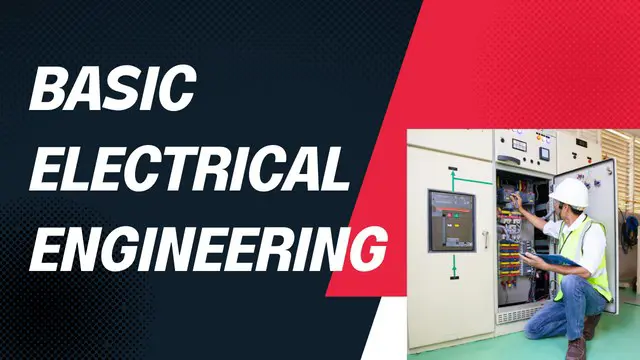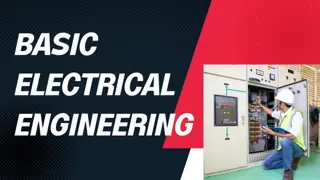
Electrician (Electrical Training) with Electrical Engineering
CPD Certified| Free PDF Certificate | Lifetime Access | Learner Support | No Hidden Fees | 100% Success Rate
EDURISE
Summary
- Certificate of completion - Free
- Reed courses certificate of completion - Free
- Tutor is available to students
Add to basket or enquire
Overview
Unlock the Power of Basic Electrical Engineering!
In today's tech-driven world, understanding the fundamentals of electrical engineering is more crucial than ever. Whether you're a novice enthusiast, a budding entrepreneur, or simply curious about how the devices you use every day work, our "Basic Electrical Engineering" course is your gateway to this electrifying realm. Discover why this knowledge is essential for businesses, careers, and a deeper understanding of the modern world.
1. Business in the Digital Age
Businesses today rely heavily on electrical systems and technologies. From powering machinery to managing data centers, companies need individuals who grasp the basics of electrical engineering to keep their operations running efficiently. Understanding the principles of electrical engineering allows businesses to save energy and cut costs while enhancing productivity.
2. Career Advancement
In the job market, possessing basic electrical engineering knowledge can make you a valuable asset across multiple industries. Employers are on the lookout for candidates who can troubleshoot electrical issues, optimize systems, and contribute to innovative projects. This course equips you with the foundational expertise that employers value.
3. Innovation and Entrepreneurship
Entrepreneurs and innovators are continually developing groundbreaking electrical products and technologies. Whether you're working on the next-generation gadget, designing smart homes, or creating renewable energy solutions, a fundamental understanding of electrical engineering is the key to unlocking innovation and staying competitive in the market.
4. Everyday Problem Solving
Imagine having the ability to diagnose and repair common electrical issues at home or in your workplace. Basic electrical engineering knowledge empowers you to troubleshoot circuit problems, manage household electrical systems, and save money by avoiding the need for professional electricians.
5. Future-Proof Your Knowledge
With the world becoming increasingly digital, electrical engineering is at the heart of technological advancements. Learning the basics today positions you for success in a rapidly evolving world. You'll be prepared to adapt to new technologies and innovations as they emerge.
This course offers you the opportunity to explore the fundamental principles of electrical engineering, from circuits and components to voltage and current. You'll gain insights into how electricity powers our world and learn how to apply this knowledge in a practical context. Unleash your potential and join us in the exciting journey of "Basic Electrical Engineering." Don't be left in the dark – enroll now and brighten your future!
Free Gift
- Course Completion PDF Certificate
- Tutor Support
- Free Session with professionals
Curriculum
Course media
Description
Module 01: Fundamentals of ElectricityLearning Outcomes:
- Understand the basic principles of electricity, including voltage, current, and resistance.
- Comprehend Ohm's law and its significance in electrical circuits.
- Identify and differentiate between conductors, insulators, and semiconductors.
Module 02: DC Networks and Network TheoremsLearning Outcomes:
- Analyze and solve direct current (DC) circuits using Kirchhoff's laws and network theorems.
- Apply nodal and mesh analysis techniques to evaluate complex DC circuits.
- Gain proficiency in circuit simplification and reduction.
Module 03: Single Phase AC CircuitsLearning Outcomes:
- Grasp the fundamentals of single-phase alternating current (AC) circuits.
- Calculate key parameters in AC circuits, such as voltage, current, and power.
- Understand the significance of capacitors and inductors in AC circuit analysis.
Module 04: Electrical MachinesLearning Outcomes:
- Explore the principles and operation of electrical machines, including generators and motors.
- Differentiate between different types of generators and motors and their applications.
- Gain insight into the efficiency and maintenance of electrical machines.
Module 05: Semiconductor DiodesLearning Outcomes:
- Learn the characteristics and applications of semiconductor diodes.
- Understand diode rectification and its role in converting AC to DC.
- Explore the principles of Zener diodes and their voltage regulation capabilities.
Module 06: Digital ElectronicsLearning Outcomes:
- Comprehend the basics of digital electronics, including binary systems and logic gates.
- Design and analyze digital circuits using Boolean algebra.
- Gain proficiency in constructing digital systems for various applications.
Module 07: Fundamentals of Communication EngineeringLearning Outcomes:
- Explore the core concepts of communication engineering, such as modulation and demodulation.
- Understand the principles of amplitude and frequency modulation.
- Analyze the transmission and reception of analog and digital signals in communication systems.
Module 08: Power Generating StationsLearning Outcomes:
- Gain insights into the operation and components of power generating stations.
- Understand the different types of power plants, including thermal, hydro, and nuclear.
- Explore the challenges and advancements in the power generation industry.
This course equips you with a strong foundational knowledge of electrical engineering, from fundamental electrical concepts to advanced topics like communication engineering and power generation. By the end of these modules, you'll have a comprehensive understanding of electricity and electronics, enabling you to apply this knowledge in various domains.
Certificate of Completion
After completing the Basic Electrical Engineering diploma course, you will be able to obtain your free PDF certificate of course completion.
Who is this course for?
The ideal audience for this course includes individuals who have a strong interest in electrical engineering, electronics, or related fields. This course is suitable for:
Students and Enthusiasts: High school or college students studying electrical engineering, electronics, or a related field will benefit from this foundational knowledge.
Electrical Engineering Beginners: Those looking to start a career in electrical engineering or electronics can gain a solid understanding of the basics through this course.
DIY Electronics Enthusiasts: Individuals interested in electronics as a hobby, including DIY projects and circuit design, will find this course valuable.
Technical Support Staff: Technicians and support staff in industries dealing with electrical and electronic systems can enhance their troubleshooting skills.
Engineering Aspirants: Those considering a career in electrical or electronics engineering can use this course as a stepping stone.
Non-Technical Professionals: Non-engineers or professionals in other fields looking to expand their knowledge of electrical concepts and electronics.
General Learners: Anyone with a general interest in understanding how electrical systems work in our daily lives.
This course serves as a foundation for understanding electrical engineering principles, making it accessible to a broad audience, from beginners to those with some prior knowledge in the field.
Requirements
The Basic Electrical Engineering course has no formal entry requirements. However, to study the Basic Electrical Engineering course students must:
Have passion for virtual learning
Have a good understanding of English, as well as numeracy and IT skills
Have a desire for Basic Electrical Engineering topic
Be over the age of 16
Career path
- Electrical Technician Trainee: Entry-level position with a typical UK salary ranging from £18,000 to £26,000 per year.
- Electrical Technician or Electrician: With experience and qualifications, salary can advance to between £27,000 and £40,000 annually.
- Senior Electrical Engineer or Electrical Project Manager: Experienced professionals in these roles may earn £41,000 to £60,000.
Questions and answers
Currently there are no Q&As for this course. Be the first to ask a question.
Certificates
Certificate of completion
Digital certificate - Included
Reed courses certificate of completion
Digital certificate - Included
Will be downloadable when all lectures have been completed
Reviews
Currently there are no reviews for this course. Be the first to leave a review.
Legal information
This course is advertised on reed.co.uk by the Course Provider, whose terms and conditions apply. Purchases are made directly from the Course Provider, and as such, content and materials are supplied by the Course Provider directly. Reed is acting as agent and not reseller in relation to this course. Reed's only responsibility is to facilitate your payment for the course. It is your responsibility to review and agree to the Course Provider's terms and conditions and satisfy yourself as to the suitability of the course you intend to purchase. Reed will not have any responsibility for the content of the course and/or associated materials.


